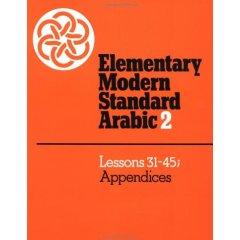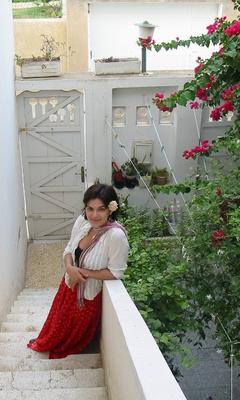Modern Standard Arabic
Today is the first day off from class since we got here, and it feels glorious to have finally caught up on sleep. I’m getting pretty good at guessing the time of day from the brightness and intensity of the sun. If I wake up at 6am, the sky is dimly light. The sun rays are just bending around the curvature of the Mediterranean horizon, lighting up the sky but not yet beating upon the earth. About 6:15am, things really light up, morning has begun. By about 10am the sun will be beating down, and hot. This continues until about 7pm, with a peak intensity around 2 or 3pm in the afternoon, and things start to cool down and soften until the dimness arrives again around 9pm.
I’m still trying to figure out this Arabic thing. I think it’s really good that I came here this summer, after my first year of Arabic study, because I’m beginning to get a sense for the language as a living working thing, rather than the bundle of abstract concepts it was before. Really I had been quite confused as to what my fus-hah skills would enable me to do. The Arabic we study in school is Modern Standard Arabic, based on classical Koranic grammar, with a lot of modern words added in. But it’s not spoken as a native language anywhere in the world, and I wasn’t sure to what extent it was going to actually enable me to talk to people.

As it turns out, it is fairly useful. Tunisians study MSA in school from the time they are kids up through high school. So, fluency in Modern Standard Arabic is a measure of how literate a person is. I can’t necessarily have a conversation with kids or people who completed less education, but I am able to speak fairly well with anyone who has had a high-school level education.
It is a second language to them, but it is a language which is more closely related to their native Tunisian dialect learned at home. Given the complexity of its grammar, I would not necessarily presume that Tunisian students find it easier to learn than French. But it’s an important language because it gives them access to materials in the Arabic heritage, and connects them to the rest of the Islamic world.
It’s somewhat frustrating to realize that I would be able to do the same thing in French, which would have been ten times easier to learn, but on the other hand, once I’m really able to do it in Arabic, I will be able to do it throughout the Islamic world. It’s enough to get around, take care of ordinary tasks, interact socially, and discuss politics with the ordinary citizen.
I’m still trying to figure out this Arabic thing. I think it’s really good that I came here this summer, after my first year of Arabic study, because I’m beginning to get a sense for the language as a living working thing, rather than the bundle of abstract concepts it was before. Really I had been quite confused as to what my fus-hah skills would enable me to do. The Arabic we study in school is Modern Standard Arabic, based on classical Koranic grammar, with a lot of modern words added in. But it’s not spoken as a native language anywhere in the world, and I wasn’t sure to what extent it was going to actually enable me to talk to people.

As it turns out, it is fairly useful. Tunisians study MSA in school from the time they are kids up through high school. So, fluency in Modern Standard Arabic is a measure of how literate a person is. I can’t necessarily have a conversation with kids or people who completed less education, but I am able to speak fairly well with anyone who has had a high-school level education.
It is a second language to them, but it is a language which is more closely related to their native Tunisian dialect learned at home. Given the complexity of its grammar, I would not necessarily presume that Tunisian students find it easier to learn than French. But it’s an important language because it gives them access to materials in the Arabic heritage, and connects them to the rest of the Islamic world.
It’s somewhat frustrating to realize that I would be able to do the same thing in French, which would have been ten times easier to learn, but on the other hand, once I’m really able to do it in Arabic, I will be able to do it throughout the Islamic world. It’s enough to get around, take care of ordinary tasks, interact socially, and discuss politics with the ordinary citizen.


0 Comments:
Post a Comment
<< Home